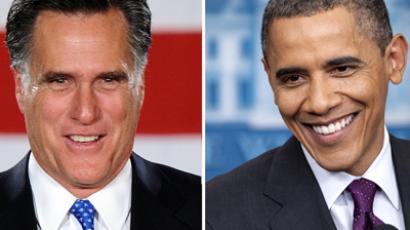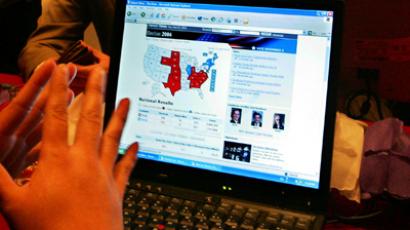'Obama puting off Iran invasion until November'
President Obama has managed to avoid war with Iran, but his wars still could come back to haunt him, Andrew Levine, a scholar at a Washington think tank told RT, exposing the pitfalls of the US electoral system and Obama's term in the White House.
RT: You contributed to a book entitled Hopeless: Barack Obama and the politics of Illusion. What was the illusion in your opinion, and how did it become hopeless?Andrew Levine: Well, Obama of course campaigned on the idea of hope and the possibility of change, but he was skillful in turning himself into something like a Rorschach figure, in which anyone could see whatever they wanted to see. The changes were not certainly ruptures with the past, but they dashed the expectations of virtually every constituency that supported him, because they envisioned transformations of American domestic and foreign policy that were far more far-reaching than what Obama actually even attempted, let alone achieved.RT: You’re writing that President Obama’s wars could come back to haunt him. In what way could they do so?AL: Well, they could all fall apart. In effect the US lost both of those wars, even before Obama assumed office. But the imperative that Obama faced, which was also the imperative that George Bush faced in his final years, was not to lose face.RT: I’d like you to expand a little bit on Afghanistan. You argue that it is turning into a face-saving operation. How is Obama handling that?AL: Well, to the extent that he can develop a consensus in the political class in the United States. To get out as soon as possible, which seems to be happening, not particularly through his own initiatives, he will get out. But unless that develops, there’s going to have to be a continued presence there of some sort that is going to continue to wreak murder and mayhem and not to achieve any of the official objectives that the US put forward in entering into that conflict in the first place. Now if that explodes then Obama will look bad, because the United States will look weak and it will look defeated, and that’s not a recipe for success for someone that has already embarked upon an electoral campaign.RT: Aside from the wars already on the US plate, you wrote that by far the biggest bullet for Obama to dodge was war with Iran. Do you think it will actually happen?AL: Well, it looks now like Obama has dodged that bullet, at least until November, by basically buying off Israel with arms.RT: What do you think about the president’s approach to Iran? AL: I think that the result is, he may have succeeded in avoiding a war between now and the election, and maybe even afterwards, one can hope, but the rationale for war remains intact. And so the danger that events could transpire which would reignite the danger – and maybe even lead to the eruption of a war – remains real, and Obama hasn’t effectively addressed that issue. I think this is an instance of a general problem with Obama’s presidency, and it’s partly why it’s very hard for anyone, any of Obama’s supporters, to come up with reasons for supporting him, especially for supporting him enthusiastically in the upcoming election, other than that the alternative is so much worse. Because whatever he’s accomplished – which on balance could be given a plus – it’s always encumbered with negatives that very nearly cancel out the benefits.RT: The Republicans have pretty scary rhetoric when it comes to foreign affairs, with the exception of Ron Paul. Yet you called President Obama the most hawkish of the lot. Why?AL: Well, he’s the most hawkish of the lot with respect to some issues, but not with respect to all issues. His position on Afghanistan is at least momentarily probably more hawkish than that of Mitt Romney. They have all of them said that now is the time to get out and Obama as the steward of the empire can’t say that…RT: He also said that. He said "gradually."AL: Gradually, to get out, yes, gradually to get out. But that’s different from getting out now, which was what even Newt Gingrich said.RT: On a different note related to domestic politics. I want to ask you about the Occupy Wall Street movement and where you think it is heading. These people took to the streets to protest the culture of revolving doors, cozy relationships between corporations and politicians, legalized corruption. Do you think their voices were heard?AL: Yes, in a general fairly diffuse cultural sense. I don’t think that Wall Street bankers are culture heroes any more the way that they used to be.RT: In terms of policymaking?AL: In terms in policymaking, probably not, at least not with this administration so far. There was a backlash that took creative form and led to a kind of awakening, a kind of consciousness raising, and where that goes now as the spring is coming and new forms of struggle are likely to emerge, and how that will interact with the political campaign.RT: Soon Americans will face a choice between Mitt Romney and Barack Obama. I want to ask you about the two-party system. Do you think Americans have much of a choice?AL: It’s sort of like…Coke and Pepsi. And the level of antagonism that undoubtedly exists in the places where those things are manufactured and marketed. At the level of underlying political vision or underlying political orientation, there isn’t that much difference, and Romney would probably be perfectly happy doing what Obama does. We have a media which is so thoroughly controlled, and all the institutions that manufacture opinion are so pervasive, and our electoral system has become basically like advertising… it’s become sales promotions. There are brands and there are people trying to sell different products, one of two products. And it’s a pressure – it’s not so much that it’s a pressure that’s hard to resist – it’s a pressure that most people aren’t even aware that there is an alternative.RT: That’s what I wanted to ask. Is there a chance for a third product to somehow get into this?AL: Well, historically that only seems to happen to some small extent when the third product is backed by a huge amount of money, like when Ross Perot was running for president. And the greens can’t do that, and they’re not going to.RT: You know, according to one of the latest Gallup polls, a record number of Americans, 40 per cent of Americans, identify themselves as independent, and they don’t have their candidate, effectively.AL: We have a very profound disconnect between what people want in any meaningful and recognizable sense of the term and what the political process offers in the way of alternatives by the way that the party system has evolved, especially in recent years that makes it increasingly possible for corporations and for very rich people to effectively control the political process, and under those circumstances it doesn’t matter that much what people want, or even that much how involved people are.














